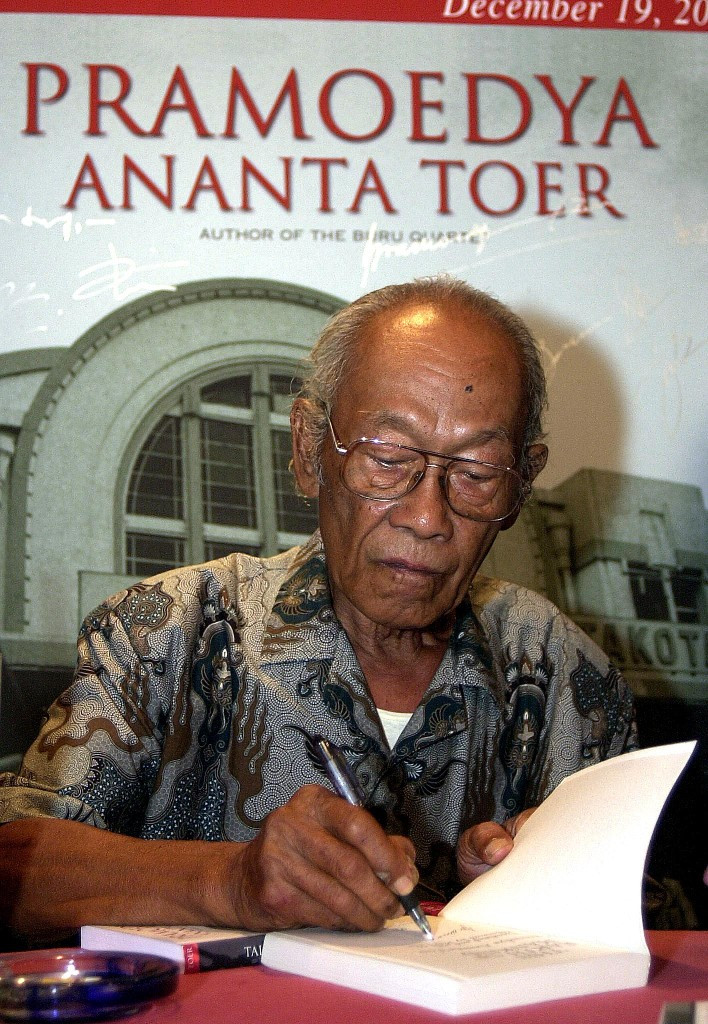Popular Reads
Top Results
Can't find what you're looking for?
View all search resultsPopular Reads
Top Results
Can't find what you're looking for?
View all search resultsIn Pramoedya's footsteps
If anything, Pramoedya was not content to just write and comment about the state of the world, but in a long tradition practiced by resistance writers like Albert Camus and Maxim Gorky, he decided to engage the world through direct action.
Change text size
Gift Premium Articles
to Anyone
C
elebrated author Pramoedya Ananta Toer was not the kind of writer to compose highfalutin prose and verses from an ivory tower from the comfort of an air-conditioned building, far away from society’s problems and the struggle of everyday people.
If anything, Pramoedya was not content to just write and comment about the state of the world, but in a long tradition practiced by resistance writers like Albert Camus and Maxim Gorky, he decided to engage the world through direct action.
When the Republic was still in its infancy and still had to defend itself against the possible return of the Dutch Colonial power in the wake of the Declaration of Independence in 1945, Pramoedya decided to take up arms and joined the army while continuing to chronicle the country’s post-colonial trial and tribulation that became the materials for his early masterpieces like Perburuan (The Hunt) and Keluarga Gerilya (Family of Rebels).
His conviction that literary works should be more than just a means of entertainment and serve as tool to effect changes in society led him to affiliate himself with the leftist organization Lekra (the Institute for People’s Culture).
And as with any iconoclasts, Pramoedya was not interested in being a court jester or the Palace scribe. The writer, who passed away in 2006 and celebrated his centennial this week, focused his attention on the underclass, the marginalized and those on the other side of the law.
His unrelenting skepticism toward power and people in power landed him in hot water on many occasions.
No other writer in this country was sent to jail more than Pramoedya, who was first locked up in 1947 by the Dutch authority for joining the resistance movement. He was again sent to prison under the Sukarno administration when he wrote a critique of the military’s anti-Chinese pogrom in 1959.
Pramoedya’s longest incarceration of course came with the arrival of the New Order regime, a staunchly anti-communist regime led by General Soeharto. He spent a total of 14 years in exile in the Buru penal colony under a harsh condition and was stripped of the most basic amenities, including pen and paper.
But even with this harshest form of punishment, Pramoedya never lost his faith in humanity and the power of the arts to save humanity from its uglier impulses.
It was during the Buru incarceration that Pramoedya finished the Buru Quartet: The Earth of Mankind, Child of All Nations, Footsteps and House of Glass, a fictionalized account of the birth of the idea of Indonesia as a nation, which was first shared with his fellow inmates orally. Also in Buru, he finished what many considered to be his magnum opus The Mute’s Soliloquy: A Memoir.
The Buru works are the kind of fiction that sends shivers down the spine of despots, the kind that works as an inspiration for young activists growing up in the 1980s and the 1990s to mount an opposition against New Order.
When bibliophiles descended in Pramoedya’s hometown Blora this week, they were celebrating the triumph of his literary works as much as they remembered his life, which continued to inspire a younger generation of readers and writers.
As part of Pramoedya’s centennial this week, the local administration in Blora planned to name a stretch of road in the city center after the writer. Yet, the decision was put on hold following a protest from a militia organization who rejected the idea of having a “communist” being given a memorial in the city.
It seems that three decades after New Order regime, Pramoedya’s thoughts and ideas are still deemed too dangerous.











